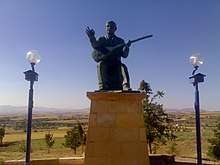Aşık Mahzuni Şerif
Şerif Cırık, known by all as Aşık Mahsuni Şerif, was an ashik, folk musician, composer, poet, and author from Turkey.[1] He is remembered as the most well-known and loved Ashik of his time.
Aşık Mahsuni Şerif | |
|---|---|
 Aşık Mahsuni Şerif's statue in Hacıbektaş, Turkey | |
| Background information | |
| Birth name | Şerif Cırık |
| Also known as | Aşık Mahsuni Şerif, Mahsuni Şerif, Mahsuni |
| Born | 17 November 1939 Berçenek Village, Afşin, Kahramanmaraş, Turkey |
| Died | 17 May 2002 (aged 62) Porz, Köln, Germany |
| Genres | Turkish folk music |
| Years active | 1961-2002 |
Mahzuni Şerif was born in Berçenek village of Afşin, Kahramanmaraş, Turkey in 1939.[2][3] The word Aşık preceding his name is a title used to indicate his position as a respected musician, but also indicates his affiliation with Alevism, a variety of Shi'a Islam.
He became one of Turkey's best-known musical interpreters, and brought strong intellectual and social elements into Turkish folk music and folk poetry. He died on 17 May 2002 in Porz, Köln, Germany, four days after his arrival for medical care for his heart problems.
Chronology
- 1950: He finished primary school in Berçenek and continued school at Elbistan Alembey village in Kahramanmaraş, where he learned to read and write in old Turkish language.
- 1957: He visited Mersin Astsubay school (military school).
- 1960: He started Ankara technique military school but was expelled due to undisciplinary actions.
- 1961 From this time forward he starts producing music cassettes and LPs.
His writings become more widely known.
- 1972: His house in Gaziantep was set on fire and his entire archive was burned.
- 1989-1991: Aşık Mahzuni was chosen head of Halk Ozanları Derneği (Association of Turkish ashiks).
- 1997: He suffered a cerebral hemorrhage and he was examined in Ulm, Germany.
- 1998: He becomes proprietor of 58 cassettes and 8 books. In several countries his music was covered in other languages.
- 2001: He was accused by the DGM (Turkey's State Security Court) of one of his sayings.[1] However, no penalty was attributed thereafter.
- 2001: In late 2001, he suffered from heart problems and a heart attack.
- 2002: He died in Köln while under medical supervision for four days.